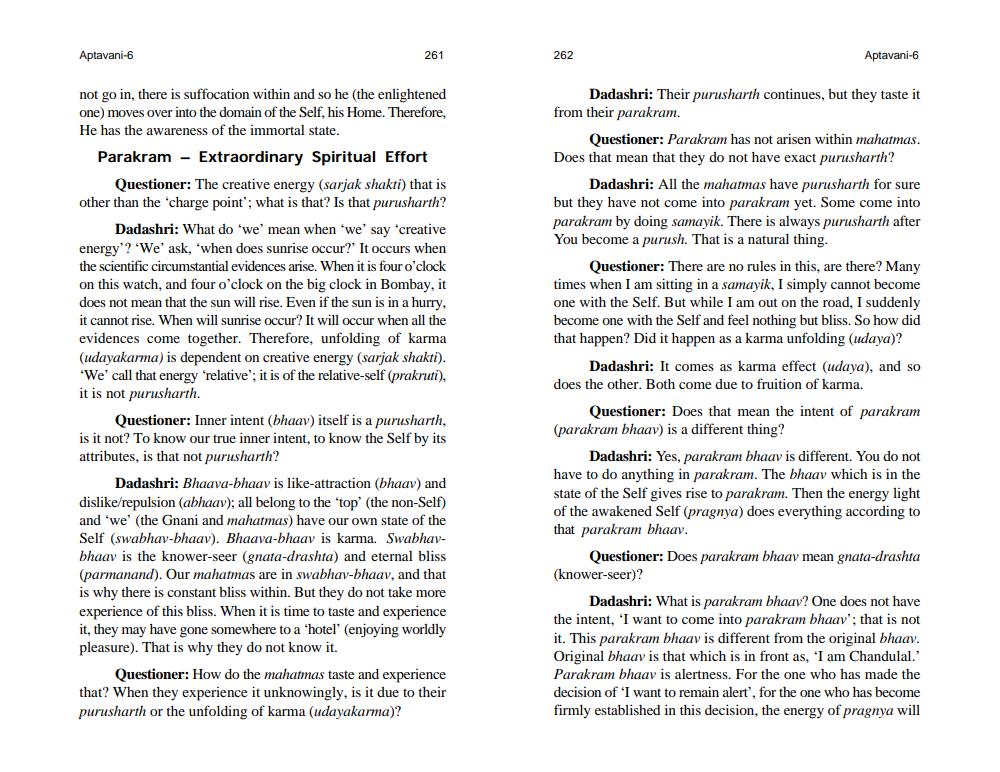________________
Aptavani-6
261
262
Aptavani-6
not go in, there is suffocation within and so he (the enlightened one) moves over into the domain of the Self, his Home. Therefore, He has the awareness of the immortal state. Parakram - Extraordinary Spiritual Effort
Questioner: The creative energy (sarjak shakti) that is other than the charge point'; what is that? Is that purusharth?
Dadashri: What do 'we' mean when we say 'creative energy'? 'We ask, 'when does sunrise occur?' It occurs when the scientific circumstantial evidences arise. When it is four o'clock on this watch, and four o'clock on the big clock in Bombay, it does not mean that the sun will rise. Even if the sun is in a hurry, it cannot rise. When will sunrise occur? It will occur when all the evidences come together. Therefore, unfolding of karma (udayakarma) is dependent on creative energy (sarjak shakti). 'We call that energy 'relative': it is of the relative-self (prakruti), it is not purusharth.
Dadashri: Their purusharth continues, but they taste it from their parakram.
Questioner: Parakram has not arisen within mahatmas. Does that mean that they do not have exact purusharth?
Dadashri: All the mahatmas have purusharth for sure but they have not come into parakram yet. Some come into parakram by doing samayik. There is always purusharth after You become a purush. That is a natural thing.
Questioner: There are no rules in this, are there? Many times when I am sitting in a samayik, I simply cannot become one with the Self. But while I am out on the road, I suddenly become one with the Self and feel nothing but bliss. So how did that happen? Did it happen as a karma unfolding (udaya)?
Dadashri: It comes as karma effect (udaya), and so does the other. Both come due to fruition of karma.
Questioner: Does that mean the intent of parakram (parakram bhaav) is a different thing?
Dadashri: Yes, parakram bhaav is different. You do not have to do anything in parakram. The bhaav which is in the state of the Self gives rise to parakram. Then the energy light of the awakened Self (pragnya) does everything according to that parakram bhaav.
Questioner: Does parakram bhaav mean gnata-drashta (knower-seer)?
Dadashri: What is parakram bhaav? One does not have the intent, 'I want to come into parakram bhaav'; that is not it. This parakram bhaav is different from the original bhaav. Original bhaav is that which is in front as, 'I am Chandulal.' Parakram bhaav is alertness. For the one who has made the decision of 'I want to remain alert', for the one who has become firmly established in this decision, the energy of pragnya will
Questioner: Inner intent (bhaav) itself is a purusharth, is it not? To know our true inner intent, to know the Self by its attributes, is that not purusharth?
Dadashri: Bhaava-bhaav is like-attraction (bhaav) and dislike/repulsion (abhaav); all belong to the 'top' (the non-Self) and 'we' (the Gnani and mahatmas) have our own state of the Self (swabhav-bhaav). Bhaava-bhaav is karma. Swabhavbhaav is the knower-seer (gnata-drashta) and eternal bliss (parmanand). Our mahatmas are in swabhav-bhaav, and that is why there is constant bliss within. But they do not take more experience of this bliss. When it is time to taste and experience it, they may have gone somewhere to a 'hotel' (enjoying worldly pleasure). That is why they do not know it.
Questioner: How do the mahatmas taste and experience that? When they experience it unknowingly, is it due to their purusharth or the unfolding of karma (udayakarma)?




